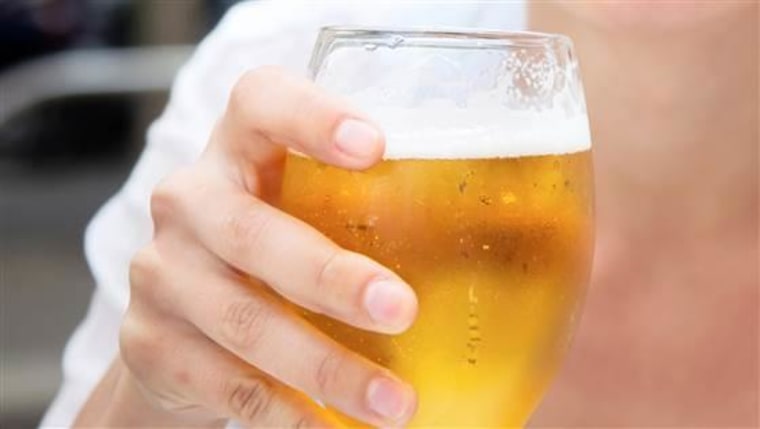Those early tastes of dad's brewski or mom's merlot may leave a troubling legacy as young sippers are more prone than their peers to party harder by the time they hit high school, researchers reported Tuesday.
Children who sampled alcohol by or before sixth grade were five times more likely than their non-sipping schoolmates to finish off a full adult beverage while in ninth grade — and four times more apt to have binged or been drunk, according to a study by Brown University.
The findings — based on a 10-year study of more than 500 students — should put a cork on the notion that letting your kids take a swig offers them a "protective factor" against later alcohol abuse, the paper asserts.
But don't think initial trickles of beer, wine or liquor somehow rewire kids, turning on a later thirst for hard stuff. Researchers say children who get an occasional sip from parents don't consume enough to change their brains. This appears, they say, to be about confusing signals from some parents who proclaim "don't drink until you're 21," but whose actions may hint that experimentation is acceptable.
"Kids this age are very concrete thinkers. They can’t differentiate between a sip or two in the home versus a couple of sips outside the home. So they are getting a message and they’re not able to interpret the nuances," said Kristina Jackson, the author and an associate professor of behavioral and social sciences at Brown.

The results were self-reported by 561 students who were originally recruited for the ongoing survey while attending one of six urban, rural and suburban middle schools in Rhode Island. They're now in high school.
The youngest first sips in the group came at ages 3 or earlier. But the most common age for kids to be first handed a bottle or a glass was 10, accounting for 26 percent of the alcohol introductions, the study found.
Wine was the most common type of drink for that inaugural sipping occasion (40 percent), beer was second (35 percent). The kids were typically offered the drinks by a parent or another adult family member (76 percent), but a small share of the teens recalled that their initial imbibing was purely an accident.
"Parents should just make sure that children know when drinking is acceptable and when it’s not — how ever the parent chooses to define it," Jackson said.
"But one thing to be clear about is that kids (who sip) are not doomed," she added. "We’re still only talking about a quarter of the sippers reporting a full drink by ninth grade and less than 10 percent are reporting getting drunk."
Researchers, funded by the National Institutes of Health, purposely didn't track any alcohol consumption done as part of a religious service.
They also controlled for factors they expected to lead to teen drinking such as an underlying disposition for problem behavior or their parents’ own alcohol habits. Even with those removed, Jackson said, they still saw the same patterns.
“That doesn’t surprise me at all," said Howard Samuels, a licensed therapist with a doctorate in clinical psychology, and founder and CEO of The Hills Treatment Center in Los Angeles.
"It sort of reinforces what I see on the front lines, which is that most of the people I get into treatment who are alcoholics and drug users usually learn that at a early age from their parents. It’s just a reality," Samuels said. "Any family that has structure and discipline isn’t going to allow a young child to have a drink."
Then how to explain the social norms of certain European countries? In France, Spain and Italy, among others, children in some families have for generations been allowed to drink wine at the dinner table along with the adults.
“They look at alcohol very differently in all of these groups. They teach young people in the home how to drink. But they also frown very strongly on abuse of alcohol by anybody," said David J. Hanson, professor emeritus of sociology at the State University of New York at Potsdam. He has researched alcohol-consumption behaviors for more than 40 years.
"It isn’t the fact that alcohol went down their gullet [that caused teen drinking]. It’s what meaning the alcohol has to them and what their expectations are about it. These are really important things," Hanson said.
In that sense, he agrees that how kids later handle booze typically comes back to lessons they learned from their own parents. But he disagrees with the belief that kids shouldn't be allowed to sip at all.
"People who learn to drink alcohol [in healthy ways] from their parents tend to have fewer problems later on," Hanson said. "In other words, they learn how to drink, they learn appropriate attitudes."